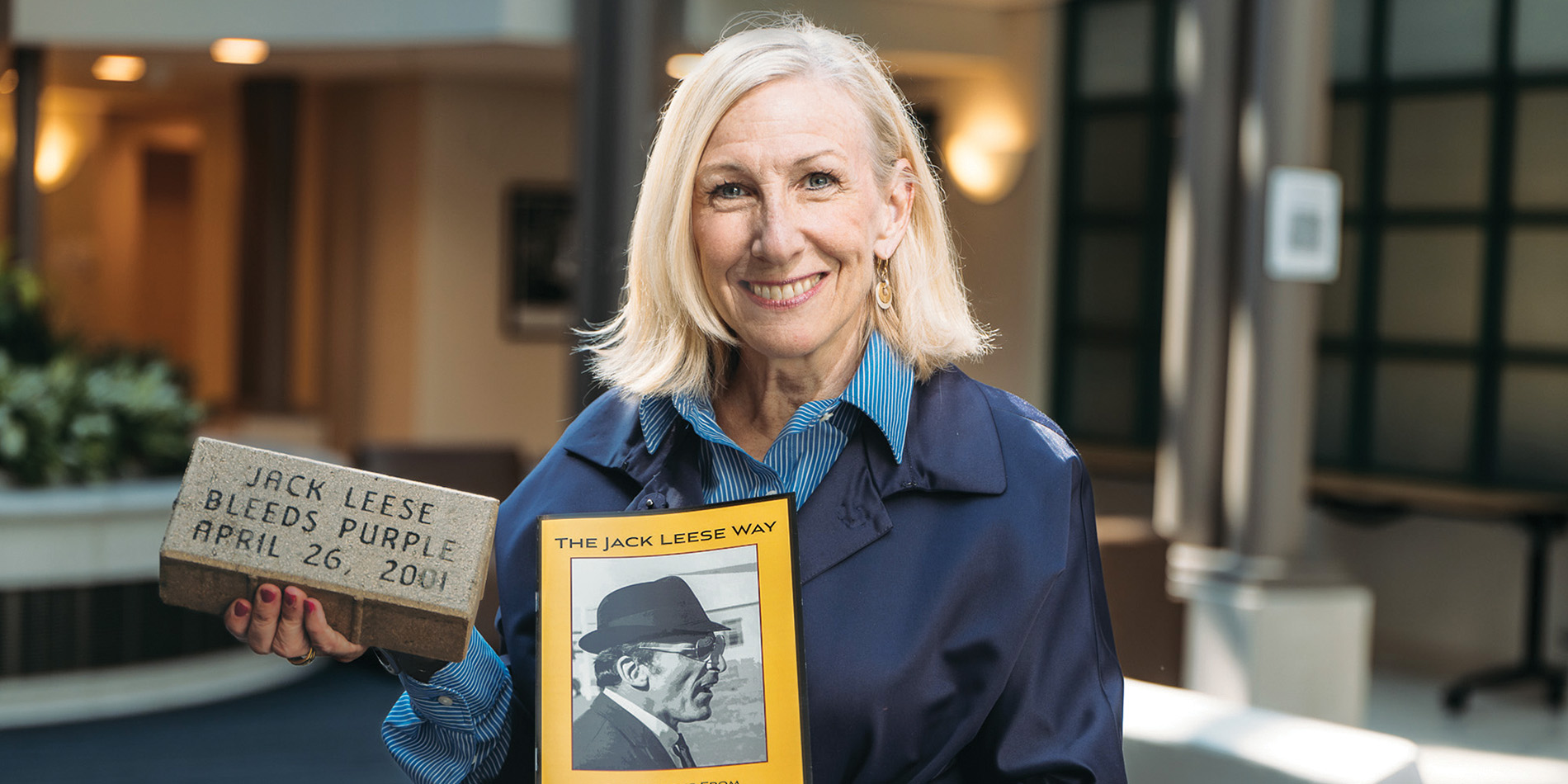School News
The Jack Leese Way
Stephanie Leese Emrich, (pictured above), the daughter of Jack Leese (BS57, MS58), was recently reunited with a beloved memorial brick that lived in the Ryan Field end zone for decades. It reads “Jack Leese bleeds purple”—and he was indeed, one of Northwestern's biggest fans.
Leese—a legendary football coach at East Leyden High School in Franklin Park, Illinois, a wrestling official, and a member of the Chicagoland Sports Hall of Fame—left behind “a legacy of service and commitment that continues to inspire student athletes,” according to an Illinois House resolution passed after his death in 2023.
Address Change: A New Home for SESP
A $10 million gift from Steve and Tracy Cahillane will help transform SESP’s new home—the Donald P. Jacobs Center—into a hub for research, learning, and student engagement. The renovation is expected to be completed in 2026.
At the heart of campus along Sheridan Road, the Jacobs Center was built in phases between 1972 and 2001 and most recently housed the Kellogg School of Management. Then known as the School of Education, SESP moved in after the Old College building was struck by lightning in 1972 and remained there until Annenberg Hall opened in 1993.
In addition to SESP, the renovated building will be the new home of the Roberta Buffett Institute for Global Affairs, the Institute for Policy Research, and several departments of Weinberg College of Arts and Sciences.
For many SESP alumni, Annenberg Hall, with its cozy student affairs office, candy bowl, and glorious lake views, will forever be home. But rest assured, the candy bowl will be making the move. Have a favorite memory of your time in Annenberg for a future issue? Please send it to sespalums@northwestern.edu .
Studying School Reparations
Northwestern researchers received a five-year, $4.5 million grant from the National Science Foundation to study racial equity, STEM education, and school reform in Evanston.
The project takes into consideration two contentious events: the 1967 closing of a neighborhood elementary school in Evanston’s historically Black Fifth Ward, and the school district’s 2022 decision to open a new elementary school in the ward as a form of educational repair.
The researchers will work closely with Evanston/Skokie School District 65, the city of Evanston, Black families in the Fifth Ward, and community groups to ensure that students attending the new school experience rich, rigorous, and culturally relevant STEM learning, says Sepehr Vakil, a lead investigator and associate professor of learning sciences.
Other key researchers include Nichole Pinkard, the Alice Hamilton Professor of Learning Sciences at SESP, and kihana miraya ross, assistant professor of Black studies in Weinberg College of Arts and Sciences.
Mulroy Honored for Grad Student Support
Political scientist Quinn Mulroy received the 2024 Ver Steeg Award from Northwestern’s Graduate School for her work supporting graduate students throughout the University.
Mulroy, an assistant professor of human development and social policy, is cofounder and co-coordinator of the Connections program, a “first look” experience for historically marginalized students planning to apply to PhD programs in human development, social policy, and related fields. She also codeveloped the Politics and Policy Lab to improve mentorship, advising, and training for graduate students, a group that now includes close to 50 people.
“She has a gift of pushing for rigor while being supportive and encouraging,” says Cynthia Coburn, professor of education and social policy and Mulroy’s former program chair.
“Quinn’s mentorship is caring, subtle, and pragmatic, with lasting impacts on the SESP and broader North- western communities,” adds graduate student Claire Mackevicius. “She helped me bridge multiple disciplines to craft my dissertation projects and consistently provides deep and rich feedback on every draft I share.”
MSLOC Program Accelerates
The Master’s in Learning and Organizational Change program is now offering an immersive, accelerated one-year degree path. Previously, students could complete a graduate degree or certificate in 1½ to 5 years.
“Flexibility has always been a hallmark of the MSLOC program,” says program director Kimberly Scott, associate dean for innovation and program development. “We are always looking for new ways to help leaders develop and hone their vision, knowledge, and skills to create sustainable, positive change in organizations.”
The accelerated program will start each fall quarter, and students will take classes with other full- and part-time MSLOC students, giving them both a close-knit cohort and full community engagement. The accelerated option is ideal for professionals taking a learning sabbatical, career changers, parents, and others looking for an intensive academic bridge to their next journey, says Diane Knoepke, the program’s director of engagement and outreach.
